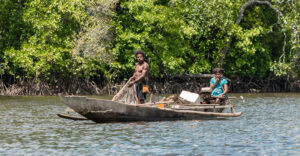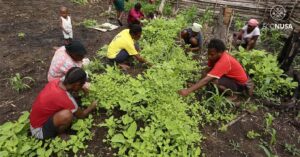
Earth condition is getting worse. It is as a matter of time until mankind existence extinct. Accumulation of natural disasters is on the rise annually. The National Disaster Mitigation Agency (BNPB) recorded 3,768 natural disasters happened in 2019 which rose by 371 as from that of in 2018.
The degrading nature made researchers give estimated time for mankind to endure prior to the “Dooms Day”. The Breakthrough National Center for Climate Restoration’s scenario concludes that human population could only survive until 2050. The ongoing carbon emission will rise the earth temperature up to 3 Celsius degrees. Prolonging drought, food production scarcity, extreme weather, deadly heat are inevitable conditions.
The Breakthrough National Center for Climate Restoration is not the only institution echoing horrible foresight of human apocalypse. Notable Physicist Stephen Hawking has many times predicted the catastrophe in the world in various forums. Hawking said human only has 100 years ahead to survive on the earth.
If only we decide to believe the “2050 scenario”, we have three decades left to make every endeavor to keep the scenario buried under research paper and online search engine. When we believe Hawking’s foresight, there is still enough time to make his prophecy never happen.
Daniel Baskara Putra, Hindia band musician, believed the old proverb that reads earth is the dwelling we borrow from the next generation. This kind of mindset requires that every human action should be based on long term decision. In brief, human should return the earth to the next generation in the same condition as human firstly dwelled.
“How we could give back the earth to our next children on the same condition is the question. Perhaps it looks normative. But, as to me, such things are rarely used,” said Hindia lead vocal to EcoNusa.
Teaching and knowledge on love to environment has actually been done from early life. Through school of nature, parents try to introduce nature to their children. Then, knowledge on nature appears in twelve years of education from elementary to senior high schools.
Sadly, economic growth every so often overlooks the impact to the nature. Worse still, forests in Sumatera up through to Papua remain degraded despite the fact that all peoples should stay home to curb Covid-19. Illegal logging and mining, illegal fauna trading keep on running.
As man of economic, Baskara realized that there is no perfect consumer. For instance, despite the hazard of single use plastic, in fact the use of such plastic remains unavoidable. Similarly happens to forest protection. The use of paper for various need is still inevitable.
“It is less possible that we become a perfect consumer. Many questions us for using a bamboo-made straw. When one using a plastic straw does not work in macro context, what about if all people does the same? I think it is just a small thing, but to me it is crucial,” Baskara said.
As to him, the collective small actions from various community elements are badly required to suspend earth from worse destruction. It takes longer time to restore earth than time to destroy it. Baskara illustrated the destruction of nature is like a domino effect collision.
“Do what we can. When we see a better cause, we will support it if we afford fortune. Finally, the way we do from small things will give pressure to wider public and policy maker,” he said.
Editor: Leo Wahyudi & V. Arnila Wulandani







